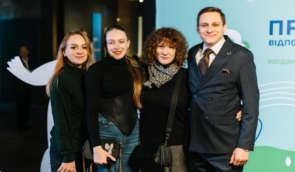5 AM: “I woke up to the sounds of bombs in Kyiv”
It has been a year since Tetiana Pechonchyk, Head of Board of Human Rights Centre ZMINA, woke up at 5 AM to the sounds of bombs falling around her home in Kyiv, Ukraine. A year on, Tetiana and her team are continuing to fight for their freedom. We sat down with her to hear about how the past year has been for her and her team.
Many people from the international community ask me: How can they help our Ukrainian civil society in exile? To which I respond, which civil society in exile? We do not intend to work in exile, despite the war and attacks on Ukraine, our goal is to stay and do everything possible on the ground.
“The fact that Ukrainian civil society in its overwhelming majority stayed in Ukraine was crucial to the war effort, especially in the first weeks and months of this large-scale invasion.”
In the first few weeks ordinary people started to volunteer, they helped with humanitarian aid, medical assistance and stood strong in the face of this catastrophe. During the first few weeks many foreign missions left, we therefore did not feel any significant help from international community on the ground at that time. Thanks to the bravery of Ukrainian defenders, the situation has changed and many foreign missions came back to Ukraine. While we are grateful for this, I think, in the end, the most difficult time we must face alone.
The work has continued
We currently spend a lot of our time and efforts documenting war crimes and conduct field missions to the liberated areas from Russian invasion. It is very important to gather and document first-hand accounts properly so this data can later be used during domestic criminal proceedings.
We are also currently hosting a tour across different cities in Ukraine about Crimea and its political prisoners. The situation in Crimea has deteriorated significantly throughout the last year. The number of political prisoners for instance, has increased significantly, but this is overshadowed by the atrocities and worsening situation in the newly occupied areas.
“These prisoners and their families, they worry that they will be forgotten in this nightmare.”
5 AM
Even before the war, Russian law enforcement agents and Federal Security Service (FSB) representatives often started their searches in the early morning, entering the Crimean Tatar houses at 5am in the morning. For years, they continued this practise. Then on 24 February, at 5 AM, they attacked Ukraine. I woke up from the sounds of bombs in Kyiv.
5 AM is therefore also the name of the new coalition of 31 civil society organisations (CSOs) that ZMINA is a part of. The CSOs are from different regions of Ukraine and are working on different fields of expertise. From the first days of the invasion we understood that in the face of this huge disaster and overwhelming number of atrocities we need to work together to collect as much data as possible and share knowledge.
Current Challenges
This year has been difficult and there have been several challenges. Just the sheer scale of the disaster is overwhelming. The current number of war crimes and crimes against humanity is colossal and every day, new crimes are being committed. The current data for instance, does not include what is happening in the currently occupied areas, like the city of Mariupol.
The challenge then also lies with how to process these crimes. How do you collect information on such a large scale and subsequently investigate? Here the ICC will help us, but the truth is also that the ICC will probably select only a very small number of these cases.
We understand that the biggest challenge for us, we understand is that this task falls to Ukraine itself, to collect information and investigate into these crimes as much as possible. As Ukraine’s civil society on the ground, we would like to do everything possible to ensure we can collect as much information as possible. We understand this task will not be completed in just a few years. I am preparing myself to continue working on this until the end of my life.
Source: Netherlands Helsinki Committee
If you have found a spelling error, please, notify us by selecting that text and pressing Ctrl+Enter.















